Politics
Trump and Putin 'will try to mend ties', Kremlin says
US President-elect Donald Trump and Russian President Vladimir Putin will try to "normalise US-Russia ties", the Kremlin has said, following a phone conversation between the two.
Mr Putin wished Mr Trump "success in implementing the election programme".
Mr Trump, who had praised Mr Putin in the election campaign, said he wanted an "enduring relationship with Russia".
Meanwhile, President Barack Obama said Mr Trump had told him he remained "committed to a strong Nato".
'Pragmatic'
The Kremlin revealed Mr Trump and Mr Putin had discussed Syria and agreed that current Russian-US relations were "extremely unsatisfactory".
Meet President Trump's possible cabinet
Who is Trump's chief strategist?
Obama urges Trump to reach out
Trump's promises: Before and after
They also talked about the fact that 2017 marked 210 years since the establishment of diplomatic relations between the countries "which in itself should stimulate a return to pragmatic, mutually beneficial co-operation".
Mr Putin and Mr Trump had agreed to stay in touch by phone and arrange to meet in person at a later date, the Kremlin added.
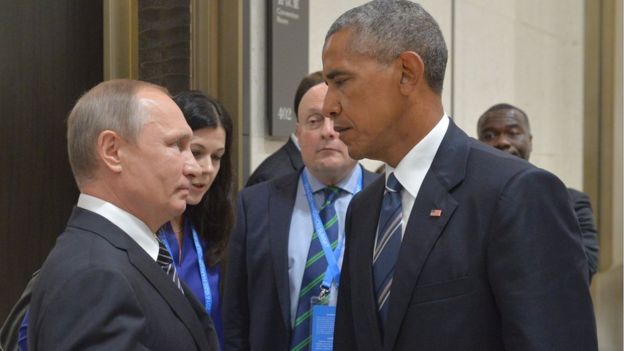
Relations between Mr Putin and President Barack Obama have been frosty
The Kremlin did not make it clear who had initiated the phone call.
But Mr Trump's office said the Kremlin had called and that issues such as mutual threats and challenges, and strategic economic affairs, were discussed.
It said: "President-elect Trump noted to President Putin that he is very much looking forward to having a strong and enduring relationship with Russia and the people of Russia."
Mr Trump's election has seen a change in tone from Russia towards the US, with state TV channels quickly switching from claims of electoral fraud to hailing the triumph of the "man of the people".
The BBC's Steve Rosenberg in Moscow says that Russia views America's new president as a pragmatist - a brash businessman that Russians can do business with.
Relations between the two countries have soured in recent years, despite President Obama starting his eight years in office by calling for a "reset" with one of the US' long-term rivals.
While Russia and the US have managed to work together on issues like North Korea and Iran, they have openly clashed on Syria.
Mr Obama has also condemned Russia's intervention on the side of pro-Russian rebels in eastern Ukraine, while Russia's decision to grant whistleblower Edward Snowden asylum infuriated Washington.
Mr Trump's rival for the presidency was no better liked in Moscow. Hillary Clinton was sharply critical of Russia's 2011 parliamentary elections, leading President Putin to accuse her of fomenting the mass protests against him that followed.
'Beacon of hope'
Mr Obama met Mr Trump last week and, at a press conference on Monday, said the new president had "expressed a great interest in maintaining our core strategic relationships", including "strong and robust Nato" partnerships.
During the election campaign, Mr Trump had openly criticised those Nato members who he believed were not doing enough work within the organisation and had relied too heavily on the US.
Mr Obama was speaking ahead of a trip that takes in Germany, Greece and Peru.
He said he hoped Mr Trump would "look at the facts" of the nuclear deal agreed with Iran, an accord the president-elect has to this point resolutely opposed.
Mr Obama said he "absolutely" still had concerns about a Trump presidency and that there would be "certain elements of [Mr Trump's] temperament that will not serve him well unless he recognises them".
But he said there was "enormous continuity" in the US presidency and he believed the US would remain a "pillar of strength and a beacon of hope to peoples around the globe".
Mr Trump will succeed Mr Obama in the White House on 20 January.
Source: bbc.com
- Read more
-
14/Nov/2016
Trump election: Up to three million migrants 'to be targeted'
US President-elect Donald Trump has said he will deport or jail up to three million illegal migrants initially.
Those targeted would be migrants with criminal records, such as gang members and drug dealers, he told US broadcaster CBS in an interview.
He also confirmed that another election promise, to build a wall with Mexico, still stood but could include fencing.
The Republican defeated Democrat Hillary Clinton in Tuesday's presidential vote.
His victory shocked many who had expected Mrs Clinton to win following favourable opinion polls.
Mr Trump is due to take over at the White House on 20 January, when Barack Obama steps down after two terms in office.
Both houses of Congress are also under Republican control.
Reality check: Analysis by Anthony Zurcher, BBC News, Washington
For the first time since winning the US presidency, Donald Trump has put a number on how many people he plans to deport from US soil and it's a big one - two to three million.
Although he says this group is comprised of violent criminals, drug-dealers and gang members, to hit such a high mark would involve either casting a very wide net that covers even the smallest infractions or also deporting legal alien residents of the US with criminal convictions.
To pull this off, an expanded "deportation force" would almost certainly be necessary, but Mr Trump's advisers have spent the past few days downplaying the prospect of such an organisation.
Meanwhile, Mr Trump also has curtailed the scope of his "big, beautiful" border wall, acknowledging that it could be a fence in some areas. All of this is evidence that Mr Trump is grappling with exactly how to make his controversial immigration promises a reality.
Proposing a multi-billion-dollar wall and mass deportations is easy. Delivering, in the face of fiscal realities and opposition within one's own party, is a different matter entirely.
'The people that are criminal'
There are around 11 million undocumented immigrants in the US, many of them from Mexico.
Mr Trump pledged during the election campaign to overturn amnesties introduced by President Obama, and strictly enforce immigration laws, deporting those without correct documents.
In his first major interview to a US broadcaster since the election, Mr Trump told CBS: "What we are going to do is get the people that are criminal and have criminal records, gang members, drug dealers, where a lot of these people, probably two million, it could be even three million, we are getting them out of our country or we are going to incarcerate."
Asked about his plans for the Mexican border, he said "a wall is more appropriate" in some parts but "there could be some fencing",
Other undocumented migrants would be assessed once the border was secured, Mr Trump added.
However, another top Republican, House Speaker Paul Ryan, said on Sunday that border security was a greater priority than mass deportation.
"We are not planning on erecting a deportation force,'' he told CNN's State of the Union programme. "I think we should put people's minds at ease."
Forcing Mexico to pay for a border wall became a rallying cry among Trump supporters during the campaign.
Their candidate caused outrage by suggesting Mexicans were exporting "their rapists" to the US, along with drugs and other crime.
Walling off Mexico
- The US-Mexico border is about 1,900 miles (3,100 km) long and traverses all sorts of terrain from empty, dusty desert to the lush and rugged surroundings of the Rio Grande.
- It is one of the busiest borders in the world, with at least one million people using it each day, as well as 400,000 cars and 15,000 lorries, according to Mexico's El Universal newspaper.
- Some 650 miles are covered already by a non-continuous series of fences, concrete slabs and other structures.
- Mr Trump has previously said his wall would cover 1,000 miles and natural obstacles would take care of the rest.
How realistic is Donald Trump's Mexico wall?
In another development, Nato Secretary General Jens Stoltenberg warned Mr Trump that "going it alone" was not an option for Europe or the US.
He said the West faced its greatest security challenge in a generation.
Source: bbc.com
- Read more
-
13/Nov/2016
President Trump
Donald Trump will become the 45th president of the United States, CNN projects, a historic victory for outsiders that represents a stunning repudiation of Washington's political establishment.
Trump is sure to follow his own playbook
He's got the attention of the whole world
- Read more
-
09/Nov/2016
Hillary Clinton concedes
Donald Trump is on the verge of winning the presidency, after capturing the Democratic bastion of Wisconsin and moving within two electoral votes of the White House.
- Read more
-
09/Nov/2016
Trump surges in battleground states
- Read more
-
09/Nov/2016
US election 2016: 'Vote Trump' church arson 'a hate crime'
The mayor of a town where a black church was daubed with "Vote Trump" and set on fire says the incident is being "investigated as a hate crime".
The fire was, which badly damaged the 111-year-old church in Greenville, Mississippi, was set on Tuesday night.
Greenville Mayor Errick Simmons described it as a "hateful and cowardly act" and "a direct assault on people's right to freely worship".
Police have not named any suspects, but the FBI have joined the investigation.
A GoFundMe page set up to rebuild the church has already raised more than double its initial goal.
Mayor Simmons said: "We consider it a hate crime because of the political message which we believe was intended to interfere with worship and intimidate voters.
"It happened in the '50s, it happened in the '60s. It shouldn't happen in 2016."
The FBI and Mississippi Bureau of Investigation are assisting the investigation.
Police Chief Delando Wilson said: "We don't have any suspect at time, but we are possibly talking to a person of interest."
Surce: bbc.com
- Read more
-
02/Nov/2016
US election 2016: Obama warns fate of world at stake
President Barack Obama has urged Democrats of all ethnic backgrounds to get out and vote for Hillary Clinton, warning that the fate of the US republic - and the world - is at stake.
He said her Republican opponent Donald Trump was a threat to hard-earned civil rights, the country and the world.
President Obama was speaking at a rally in North Carolina.
Mr Trump said Mr Obama should stop campaigning for Mrs Clinton and focus on running the country.
"The bottom line is, no-one wants four more years of Obama," he told supporters in Pensacola, Florida.
He said Mrs Clinton had become "unhinged" in recent days.
- Why is Trump targeting 'Clinton' states?
- 'Vote Trump' church arson 'a hate crime'
- Clinton FBI probe: What we know
- Predict the president - play our game
- Our full election coverage
"The fate of the republic rests on your shoulders," President Obama told supporters in the key battleground state of North Carolina.
"The fate of the world is teetering and you, North Carolina, are going to have to make sure that we push it in the right direction.
"I am not on the ballot, but I tell you what - fairness is on the ballot; decency is on the ballot; justice is on the ballot; progress is on the ballot; our democracy is on the ballot."
The FBI is now investigating new emails that may be linked to its probe into Mrs Clinton's private email server.
The agency's director, James Comey, has faced a fierce backlash for announcing the move just 11 days before the presidential election.
Earlier, Mr Obama implicitly criticised him over the new inquiry into Mrs Clinton's email use.
In an interview with website NowThisNew, published on Wednesday, Mr Obama said US investigations should not operate on the basis of "innuendo" or "incomplete information".
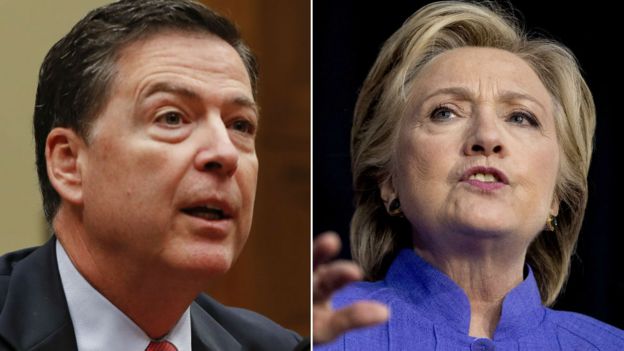
Mr Comey has come under fire from Democrats over the move
Mr Obama's remarks were his first public comments since Mr Comey's announcement on Friday that the FBI had discovered a new batch of emails that might or might not be relevant to an earlier, closed investigation into Mrs Clinton's handling of classified information.
"I do think that there is a norm that when there are investigations we don't operate on innuendo, we don't operate on incomplete information, we don't operate on leaks. We operate based on concrete decisions that are made," said Mr Obama.
"When this was investigated thoroughly the last time, the conclusion of the FBI, the conclusion of the justice department, the conclusion of repeated congressional investigations was that she had made some mistakes but that there wasn't anything there that was prosecutable."
It emerged in March 2015 that Mrs Clinton had been breaking federal rules by operating a private email server while she was secretary of state from 2009-13.
Her lawyers combed through the server and provided the state department with 30,000 work-related emails, but her campaign deleted another 33,000 messages, saying they were personal in nature.
Mr Comey concluded in July that Mrs Clinton had been "extremely careless" in handling classified information, but there were no grounds for any charges.
- Key issues - where candidates stand
- All you need to know about the US election
- Seven US Senate races to watch
- What's at stake for Supreme Court?
- Marijuana, guns and condoms also on ballot
The latest emails were found in a separate investigation into allegations that former congressman Anthony Weiner sent illicit text messages to a 15-year-old girl in North Carolina. Mr Weiner is married to one of Mrs Clinton's closest aides, Huma Abedin.
Source: bbc.com
The FBI has reportedly obtained a warrant to search the cache of emails belonging to Ms Abedin, which are believed to have been found on her estranged husband's laptop.
There are reportedly 650,000 emails to search through on the laptop, but it is unclear who sent or received the emails or what they were about.
Democrats have angrily demanded that the embattled Mr Comey rapidly make public what the agency knows about the new email trove.
- Read more
-
02/Nov/2016
Clinton emails: Officials advised FBI not to reveal inquiry
The FBI was advised by the US justice department not to inform Congress of a new inquiry into Hillary Clinton's email use, officials say.
Justice department officials said the move would be inconsistent with rules designed to avoid the appearance of interference in an election.
FBI Director James Comey acted independently when he briefed lawmakers in a letter on Friday.
Mrs Clinton said the move was "unprecedented" and "deeply troubling".
Leading Democratic senators have written to Mr Comey and to Attorney General Loretta Lynch urging them to provide more details about the investigation by Monday.
They argue that Mr Comey's decision to reveal the reopening of the case, less than two weeks before the 8 November election, is being used for political purposes.
But Republican opponent Donald Trump has praised the FBI's decision.
Speaking at a rally in Phoenix on Saturday, Mr Trump accused the justice department of protecting the Democratic presidential candidate in a "rigged system".
"The Department of Justice is trying their hardest to protect the criminal activity of Hillary Clinton," Mr Trump said, offering no evidence for the assertion.
- Clinton FBI probe: What we know
- How damaging is this for Clinton?
- Can Trump pull off a Brexit-style upset?
- FBI's Comey: Man in the firing line
In his letter to Congress, Mr Comey said the FBI had learned of fresh emails which might be "pertinent" to its previous inquiry into Mrs Clinton's use of a private server when she was secretary of state in the Obama administration.
Mr Comey, who has served in government under both Democratic and Republican presidents, has insisted that not making the inquiry public would be "misleading".
It is not clear what the emails contain or how significant they are to the investigation.
Speaking to supporters in Florida on Saturday, Mrs Clinton said: "It's not just strange, it's unprecedented. And it is deeply troubling because voters deserve to get full and complete facts.
"So we've called on Director Comey to explain everything right away, put it all out on the table."
Mrs Clinton has said she is confident the investigation into the emails will not change the FBI's original finding in July, which criticised her but cleared her of any illegal acts.
Clinton campaign chairman John Podesta said the Mr Comey's handling of the matter was "inappropriate" and the information provided was "long on innuendo" and "short on facts".
There was, he said, "no evidence of wrongdoing. No charge of wrongdoing. No indication this is even about Hillary."
Mrs Clinton's running mate Tim Kaine told NBC's Meet the Press the FBI director owed it to the public to be more forthcoming about the emails.
"We don't know whether they're to or from Hillary at all," the Virginia senator said. "[If he] hasn't seen the emails, I mean they need to make that completely plain. Then they should work to see the emails and release the circumstances of those once they have done that analysis."
But Mr Trump's running mate Mike Pence praised Mr Comey's decision, saying the emails showed Mrs Clinton was a "risky choice" and the Clinton campaign was practising the "old playbook of the politics of personal destruction" by "targeting the director of the FBI and questioning his personal integrity".
Mr Trump's campaign manager Kellyanne Conway told CNN that Mr Comey would have been accused of interfering in the election if he had not disclosed the newly discovered emails were under investigation.
How has the FBI probe affected the polls?
The bad news for Hillary Clinton is that the polls had already begun to tighten both nationally and in key battleground states before the FBI announcement on Friday.
A new New York Times poll in Florida, which was carried out earlier last week, has Mr Trump ahead of Mrs Clinton by 46% to 42%, while the RealClearPolitics polling average has the candidates tied on 44%.
Nationally, a new ABC News/Washington Post poll suggests Mrs Clinton is leading her rival by just one percentage point, down from a 12-point lead in the same poll a week ago. About a third of likely voters polled said they were less likely to support the Democrat after Mr Comey's disclosure.
But there is little evidence yet that the news will derail the former secretary of state's bid for the presidency.
In a new CBS poll of 13 battleground states, 52 percent of voters said they expected the emails to contain "more of what we already know" and most of those who said they were less likely to vote for Mrs Clinton were Republicans.
Source: bbc.com
- Read more
-
30/Oct/2016
US election 2016: We are behind, says Trump campaign
The Donald Trump campaign has admitted the Republican lags behind Hillary Clinton with just over two weeks to go before Americans cast their votes.
"We are behind. She has some advantages," said his campaign manager Kellyanne Conway, who added: "We're not giving up. We know we can win this."
On Friday, Mr Trump made a rare admission that he could lose.
New polls suggest Mrs Clinton remains well ahead nationally and in several battleground states.
Her campaign has predicted this is going to be "the biggest election in American history".
Campaign manager Robbie Mook told Fox News Sunday: "More people are going to turn out than ever before."
Polling in Republican strongholds like Utah and Arizona suggest these states could back a Democrat for the first time in decades.
If Arizona swings - Anthony Zurcher, BBC News, Phoenix
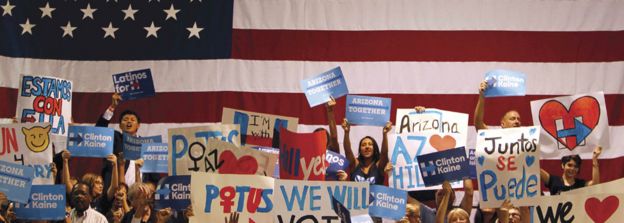
The polls may be wrong in Arizona but if they are correct, it may be the start of a Democratic trend that doesn't just put the state in play in a Clinton 2016 rout scenario, it makes Arizona a legitimate swing state in coming elections.
"The demographics in the state are continuing to change," says Arizona State University political science professor Richard Herrera. "If there is another increase in Latino voters, which there almost certainly will be, followed with an increase in party registrants, this could become a real battleground in future elections."
For Democrats, that's a dream scenario, giving them new and plentiful paths to electoral success.
For Republicans, it could mean the start of a long-term political nightmare.
That apparent change to the electoral map has prompted a shift in strategy for the Clinton camp, which is spending money on helping Democrats running in close House or Senate races.
Mrs Clinton said she didn't even bother responding to Trump anymore and would instead spend time "emphasising the importance of electing Democrats down the ballot".
Mr Trump's campaign manager said the Clinton team had a huge financial advantage in how much they could spend on negative ads against Mr Trump, and high-profile campaigners.
"She has a former president, who happens to be her husband, campaigning for her. The current president and first lady, vice president, all much more popular than she can hope to be," said Kellyanne Conway.
- Trump towers face troubles in Canada
- Trump splashes the cash
- Is Michelle Obama Hillary Clinton's biggest asset?
But this election does not feel over when you realise the depth of support Mr Trump has on the campaign trail, she said.
However, Mr Trump reflected on defeat for the first time on Friday when he said that - win, lose or draw - he would be happy with himself.
A day later, he announced a raft of measures for his first 100 days in office, that include used curbs on lobbying and new trade and climate change negotiations.
With just 16 days until the election, much of the recent focus has been on controversies linked to his campaign.
On Saturday, he promised to sue every woman who had accused him of sexual misconduct.
He also repeated his claims that the election is rigged, because of voter fraud at polling booths and media bias.
- What are the allegations against Trump?
- Trump raises spectre of 'imposter presidents'
- What if Trump refuses to accept defeat?
- Is the US election really rigged?
On Sunday, Eric Trump, Mr Trump's son, said his father would accept the outcome but only if it was a "fair" election.
What happens next?
- The two candidates will spend the remaining 16 days before the election criss-crossing the country in their bid to persuade undecided voters. Expect to see lots of appearances in battleground states such as Ohio, North Carolina, Florida and Pennsylvania
- Voters will go to the polls on Tuesday 8 November to decide who becomes the 45th president of the US
- The new president will be inaugurated on 20 January 2017
Who is ahead in the polls?
Source: bbc.com
- Read more
-
23/Oct/2016
Sao Tome and Principe president boycotts own run-off vote
In an unusual move, the president of the west African state of Sao Tome and Principe has boycotted his own run-off election, handing victory to his rival.
Manuel Pinto da Costa withdrew from Sunday's poll, alleging fraud in the first round held on 17 July.
His rival Evaristo Carvalho, a former prime minister, is now certain to win the race.
He had won the first round with 49.8% of the vote while Mr Pinto da Costa had taken 24.8%.
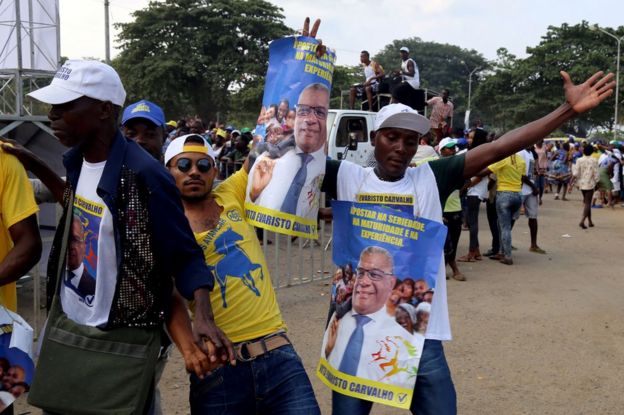
Posters of Evaristo Carvalho are seen here being brandished by supporters
Ahead of Sunday's run-off, he had called on his supporters not to vote, and later reports said many of them had stayed away.
Mr Pinto da Costa ruled Sao Tome with an iron fist for the first 15 years after independence from Portugal in 1975.
He lost the presidency after introducing reforms in 1990, including multi-party democracy, but in 2011, he was re-elected to office.
Sao Tome and Principe, a former Portuguese colony, consists of two islands of volcanic origin and a number of smaller islets lying off the western coast of Africa.
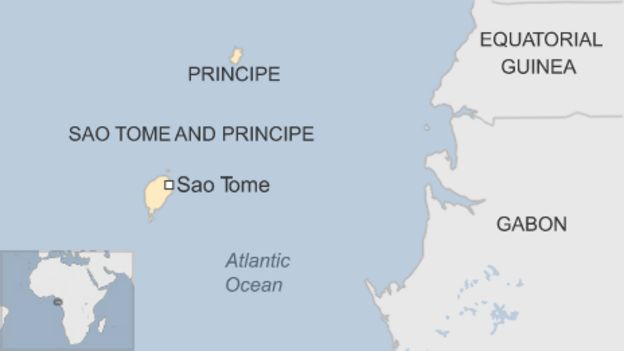
Source: bbc.com
- Read more
-
07/Aug/2016
Tunisia parliament votes to sack PM Habib Essid
Tunisia's parliament has passed a vote of no confidence in Prime Minister Habib Essid, effectively dismissing the government of the US-trained economist.
A total of 188 MPs voted to sack Mr Essid, with only three supporting him.
Mr Essid, who has been in office less than two years, has faced criticism for what his opponents say is his failure to push through economic reforms.
President Beji Caid Essebsi last month called for a national unity government to break months of economic turmoil.
Unemployment has worsened since the 2011 revolution, when President Zine al-Abidine Ben Ali was ousted. More than a third of young people in Tunisia are without work.
Tunisia's uprising was the first of the Arab Spring, and often hailed as the most successful with the country now functioning as a parliamentary democracy.
Analysis: BBC's Rana Jawad in Tunis
The confidence vote came after a month of wrangling over the fate of the prime minister, following pressure on him from the country's president to resign. Mr Essid refused to step down, citing respect for the constitutional process and instead called on the Tunisian parliament to decide his fate.
In the end, an overwhelming majority of MPs voted to oust him from office. Most lawmakers accused him of failing to deliver on economic reforms needed to ease the country's high unemployment rates.
In June, the Tunisian president proposed the formation of a new unity government, arguing that the country needed a leadership that could carry out bold reforms.
But some observers believe that the vote is also a consequence of the prime minister's detachment from party politics. Mr Essid recently accused leading parties of trying to pressure him into making changes to the cabinet, which he says he refused to comply with. It is not clear who will succeed him at this time, but parliament will start negotiations over the matter on Monday.
Source: bbc.com
- Read more
-
31/Jul/2016
US election: Obama endorses Clinton as political heir
US President Barack Obama has delivered a stirring speech at the Democratic convention, hailing Hillary Clinton as his political heir and rounding on "home-grown demagogue" Donald Trump.
"There has never been a man or woman, not me, not Bill, nobody more qualified than Hillary" to be president, he said.
When boos rang out at the name of the Republican candidate, Mr Obama simply said: "Don't boo. Vote."
Mr Trump responded by rejecting the president's portrayal of optimism.
"Our country does not feel 'great already' to the millions of wonderful people living in poverty, violence and despair," he said on Twitter.
- Watch or read the Obama speech in full
- Clinton's fans - "We are with you"
- Heavy hitters take aim at Trump
- Trump: I was being sarcastic about Russian hackers
- Have black voters lost patience with Obama?
- Katty Kay: Who women want (in the White House)
Mr Obama extolled Mrs Clinton's character, calling her a "leader with real plans to break down barriers, blast through glass ceilings and widen the circle of opportunity to every single American".
"She's been there for us, even if we haven't always noticed," he said.
Mr Obama described his nation as "full of courage", "decent and generous", but also concerned about racial divisions and "frustrated with political gridlock".
He said: "Tonight, I ask you to do for Hillary Clinton what you did for me. I ask you to carry her the same way you carried me."
The optimistic high ground - BBC's Anthony Zurcher
President Obama is good at this. He's really, really good at this.
For all his flaws - and conservatives will be quick to point them out - he's always been able to deliver a pitch-perfect speech on the biggest stages, and this was no exception.
It was the kind of speech that had some conservatives shaking their heads, wondering how their party ceded the optimistic high ground to their opponents. Mr Obama even quoted Ronald Reagan's "shining city on a hill" line, if only to make the political shift all the more clear.
But he also reserved fierce words for Mr Trump, challenging the Republican's view of the US as "a divided crime scene".
Mr Obama said the US he knew was not a "country where we turn against each other, and turn away from the rest of the world".
He added: "Our power doesn't come from some self-declared saviour promising that he alone can restore order as long as we do things his way."
Turning to Mr Trump's business acumen, he said: "I know plenty of businessmen and women who have achieved remarkable success without leaving a trail of lawsuits and unpaid workers and people feeling like they got cheated."
Mr Obama added: "Does anyone really believe that a guy who spent his 70 years on this Earth showing no regard for working people is suddenly going to be your champion, your voice? No."
The former secretary of state joined him on stage for a hug after he finished speaking.
Role reversals and political divides - US media react
Writing in the Washington Post, EJ Dionne Jr says that Mr Obama's mission in his speech was to try "to safeguard his legacy by ensuring his time in the White House would not be seen by history as having culminated in the election of Donald Trump. And so he went to work, combining rational argument with evangelical exhortation in the classic Obama fashion".
Julie Hirschfeld Davis and Michael Shear in the New York Times recall Mr Obama's speech at the 2004 convention that thrust him into the national spotlight, in which he rejected the "politics of cynicism". His challenge now, they say, is "to find a way to acknowledge that the political divides he promised to bridge have only grown deeper and more acrimonious while arguing persuasively that the way to rise above them is to elect Mrs Clinton".
On the Politico website, Michael Hirsh says Wednesday's speeches confirmed "a dramatic shift, perhaps even a reversal, of the roles the two major parties have been identified with for several decades. For the first time, perhaps, since Vietnam, the Democratic Party is now the party of national security expertise."
In his response, Mr Trump said in a statement that the Democrats had described a vision of America that did not exist for most people.
Seventy percent of Americans thought the country was on the wrong track, said the property developer, who defied all predictions to win the Republican primary contest.
"Never has a party been so disconnected from what is happening in our world."
'Not one word'
Vice-President Joe Biden earlier delivered his own spirited address, saying Mr Trump "backs torture", "religious intolerance" and "betrays our values".
"He has no clue about what makes America great," Mr Biden said, before the crowd started chanting, "Not a clue!"
Virginia Senator Tim Kaine took the stage to "humbly" accept his party's nomination for vice-president and then also went on the attack.
"Folks, you cannot believe one word that comes out of Donald Trump's mouth," he said.
The crowd then erupted into chants of "Not one word!"
In other highlights from Wednesday night:
- Former Arizona congresswoman Gabby Giffords, critically injured in a 2011 shooting, described Mrs Clinton as a president who would "stand up to the gun lobby"
- Former CIA director Leon Panetta was greeted with chants of "no more war!" as he tried to warn of dangerous foreign policy under a Trump presidency
- Ex-New York Mayor Michael Bloomberg attacked fellow billionaire Donald Trump, saying: "The richest thing about him is his hypocrisy"
- Christine Leinonen, mother of one of the victims of the Orlando nightclub shooting, made an emotional plea for gun control
Mrs Clinton will officially accept the nomination on Thursday, setting up an election fight with Mr Trump that will take them to the presidential election in November.
Source: bbc.com
- Read more
-
28/Jul/2016
Hillary Clinton selects Tim Kaine as her running mate
Democratic presidential candidate Hillary Clinton has selected Tim Kaine, a moderate senator from Virginia, as her running mate.
Mrs Clinton broke the news in a tweet to her supporters. She plans a formal announcement on Saturday.
Mrs Clinton passed over more left-leaning candidates in favour of the 58-year-old senator who opposes abortion and supports free-trade agreements.
His home state of Virginia is a major battleground in the coming election.


Mr Kaine also speaks fluent Spanish and could help the Clinton campaign maintain its support among Hispanic Americans - a growing voting bloc.
An experienced politician who has been toughly vetted, he is considered a "safe" choice for the vice-president slot.
Mr Kaine was a finalist to be Barack Obama's running mate in 2008 and served as Virginia governor before his time in the Senate.
Mrs Clinton also reportedly interviewed liberal firebrand Senator Elizabeth Warren of Massachusetts and Senator Cory Booker, an African-American senator from New Jersey.
Source: bbc.com
- Read more
-
22/Jul/2016
US election: Hillary Clinton poised to announce running mate
Presumptive Democratic presidential nominee Hillary Clinton could reveal her running mate as early as Friday, according to US media.
Her announcement would come ahead of the Democratic National Convention, which is due to begin on Monday in Philadelphia.
Senator Elizabeth Warren, a favourite choice among Democrats, has said she was "probably not" the choice.
Virginia Senator Tim Kaine has emerged as a leading contender for the role.
The former secretary of state may reveal her vice-presidential pick on the campaign trail in the key battleground state of Florida.
Mrs Clinton is expected to attend a rally at Florida International University on Saturday, where her newly minted running mate could also make an appearance.
Secretary of Agriculture Tom Vilsack, Labour Secretary Tom Perez and New Jersey Senator Cory Booker were also reportedly on the short list for the job.
However, the Clinton campaign has cautioned that the likely nominee has not yet made a final decision.
Mrs Clinton's announcement would come on the heels of Republican rival Donald Trump's address at the party's convention.
Mr Trump formally accepted the nomination while speaking for more than an hour on Thursday, vowing to fight the multiple threats facing the US, including crime, immigration and global terrorism.
Mrs Clinton was swift to respond to the billionaire's remarks, pushing back on his claims that crime was on the rise as well as blasting his play on her slogan.
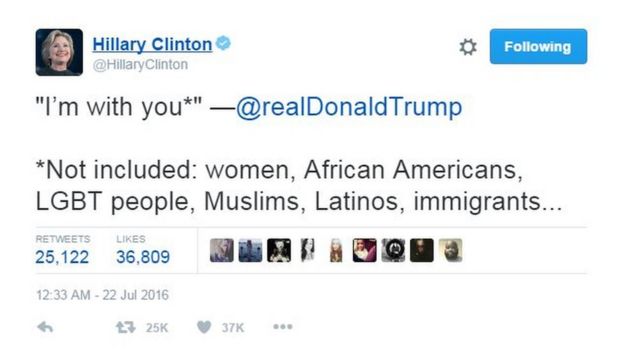
The Democratic candidate's campaign has frequently used the line "I'm With Her."
Mr Trump told delegates in Cleveland that he chose to recite a different pledge: "I'm With You."
"I am your voice," Mr Trump said. "I'm With You, and I will fight for you, and I will win for you."
Mrs Clinton quickly fired back on Twitter to describe what she believed the phrase really meant.
The announcement of a vice-presidential pick could help build anticipation for the Democratic National Convention, where Mrs Clinton will formally accept the party's nomination.
However, the Clinton campaign has remained tight-lipped about its search for a vice-president.
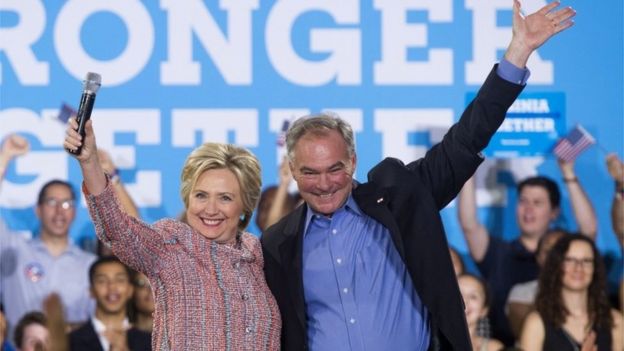
Senator Kaine has emerged as a favourite pick for the job
Senator Kaine, the former governor of Virginia, could be a boon to Mrs Clinton among white male voters and independents.
The 58-year-old was elected to the Senate in 2012 after serving as the governor of Virginia from 2006 to 2010.
Mr Kaine is fluent in Spanish and a proponent of free trade, including the Trans-Pacific Partnership and the North American Free Trade Agreement (Nafta), which Mr Trump has railed against throughout his campaign.
Agriculture Secretary Vilsack is also considered a top contender for the number two spot.
Mr Vilsack, 65, is a former governor of Iowa and has been President Barack Obama's agriculture secretary since 2009.
Senator Booker, the former mayor of Newark, New Jersey, would be the first African-American vice presidential nominee.
The New Jersey senator, who boasts a massive online following, appeared with other Democrats in Cleveland after the Republican National Convention ended.
"I'm happy to do what the coach asks me to do," said Booker, referring to Mrs Clinton.
Labour Secretary Perez has also supported the Trans-Pacific Partnership but also has criticised Nafta.
He would become the first Hispanic candidate to take on the role for the Democratic party.
Source: bbc.com
- Read more
-
22/Jul/2016
US Election 2016: Trump seals Republican nomination
Donald Trump has officially clinched the Republican nomination for US president as speakers hammered Democrat Hillary Clinton on day two of the Republican National Convention.
Mr Trump is expected to accept the nomination on Thursday after state delegates formally selected him.
The theme of Tuesday in Cleveland was "Make America Work Again".
However, the speakers focused almost exclusively on attacking Mrs Clinton, the likely Democratic nominee.
New Jersey Governor Chris Christie, a former prosecutor, held a mock trial for Mrs Clinton as the crowd chanted "lock her up".
Mr Christie and others criticised Mrs Clinton's use of a private email account while she was serving as secretary of state.
An FBI investigation said she was "extremely careless" but found her actions didn't warrant criminal prosecution.
But Mr Christie and and the crowd disagreed as Mr Christie repeatedly yelled "guilty".
He said she has "selfish, awful judgement" and was to blame for various foreign policy problems in Libya, Syria and elsewhere.
Mr Trump's children also played a prominent role on Tuesday, standing with the New York delegation as he was declared winner and delivering remarks.
As it happened: Clinton dominates day two
Under the skin of Trump country
Why the Melania plagiarism row matters
Republicans react to Melania 'distraction'
At the scene - Anthony Zurcher, BBC News, Cleveland
The result hasn't really been in doubt for months, but now it's a reality. The Republican Party's nomination for president of the United States is Donald Trump's to accept when he takes the stage on Thursday night.
Thanks to a bit of procedural manoeuvring, it was New York that gave him the winning margin in the state-by-state roll call vote. His oldest son, Donald Trump Jr, voice wavering with emotion, made it official.
"Congratulations, Dad, we love you," he said.
As a band blared the song New York, New York, the jumbo screens in this converted basketball arena proclaimed "Over the Top" with exploding gold fireworks.
Perhaps there was no more fitting way to announce the elevation of the latest Republican standard-bearer, the real-estate mogul who confesses to being a bit "braggadocious" and whose rise has roiled the party establishment and turned conventional wisdom on its head.
A tough general election fight against Hillary Clinton awaits. Conventional wisdom is the odds are long, but they aren't any more remote than what Mr Trump has already overcome to get to this point.
Mr Trump youngest daughter Tiffany Trump, whose mother is former model and dancer Marla Maples told some personal stories about her father.
She recalled scribbling notes in her school report cards and how excited she becomes when introducing him to her friends.
Her father is a "natural-born encourager" who has motivated her to work hard, she said.
His son Donald Trump Jr described him as his best friend and role model.
"When people tell him it can't be done, that guarantees it will get done," he said of his father.
He said Mrs Clinton was a risk the US cannot afford to take and that "if she were elected, she would be the first president who can't pass a background check".
Mr Trump addressed the audience via a live-stream and said the nomination was an honour.
"This is a movement, but we have to go all the way," he said. "This is going to be a leadership that puts American people first."
A convention - all you need to know
1. What's the point? Each party formally nominates its candidates for president and vice president, and the party unveils its party platform, or manifesto.
2. Who is going? There are 2,472 delegates attending, selected at state and congressional district conventions, and representing each US state and territory. Plus 15,000 journalists and thousands of other party grandees, lawmakers and guests.
3. Who isn't going? Some senior figures who don't like Donald Trump have stayed away, including two ex-presidents named Bush, former nominee Mitt Romney and Ohio Governor John Kasich.
4. What's the schedule?
- Wednesday - VP nominee Mike Pence
- Thursday - Donald Trump, introduced by daughter Ivanka
Source: bbc.com
- Read more
-
20/Jul/2016
US election: Anti-Trump floor vote fails at convention
Anti-Trump delegates have failed in their final push to block Donald Trump's nomination at the party's convention in Cleveland.
A vote that would allow delegates to back a candidate of their choice was quashed when three states reportedly backed out.
Some said the RNC sabotaged their efforts on purpose.
The push was the last gasp for those who hope to see a different Republican candidate get the nomination.
The nomination of Mr Trump has been a source of conflict in the party.
A rebellion quashed - Anthony Zurcher, BBC News, Cleveland
It may have been a last gasp. It may have been a death rattle. But the #NeverTrump forces demonstrated on Monday afternoon that there was still some life left in them.
While it's clear that the eventual adoption of the pro-Trump rules was never really in doubt, a roll-call vote would have been an embarrassing show of dissent from the delegates - something Trump's team wanted to avoid at all costs.
Despite their best efforts, however, cracks in the Republican foundation were quite visible at the start of a week in which the party is desperate to put its best foot forward.
Read more: Republican unity frays as convention opens
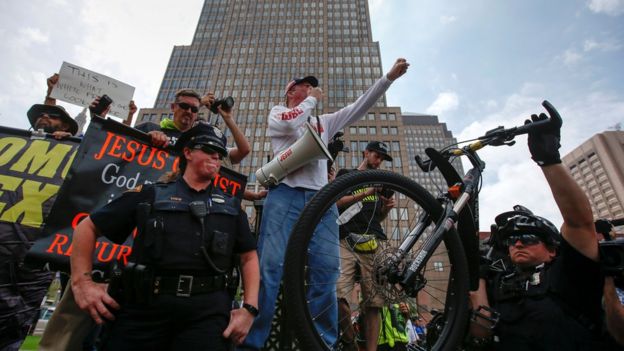
Trump supporters clashed with opponents outside
The long-simmering tensions between Trump and anti-Trump factions in the party broke into open warfare earlier on Monday.
Former House Speaker Newt Gingrich told ABC News "the Republican party has been awfully good to the Bushes and they're showing remarkably little gratitude".
The two former presidents, George HW Bush and George W Bush, have refused to endorse Mr Trump.
Mr Trump has criticised the younger Bush over the Iraq War and the 9/11 attacks, and constantly mocked Florida Governor Jeb Bush during his unsuccessful candidacy.
His top aide Paul Manafort launched a stinging attack on the governor of the state hosting the convention, the popular John Kasich, describing his decision to stay away as an "embarrassment".
Former nominee Mitt Romney has also refused to attend, voicing concerns over Mr Trump's tone and extreme stance on immigration.
Among the speakers due to appear on Monday evening are Mr Trump's wife Melania and Iowa Senator Joni Ernst, on a theme of Make America Safe Again.
The convention begins amid high tensions, a day after a man killed three police officers in Baton Rouge, prompting Mr Trump to say the country was falling apart - a claim strongly disputed by President Barack Obama.
- Gunman's videos shows anger at police
- How many die each year in police shootings?
- Who was the Baton Rouge shooter?
People are not allowed to take guns into Cleveland's Quicken Loans Arena, which is hosting the four-day event, or within a secure zone outside.
But some people were photographed openly wearing guns nearby.
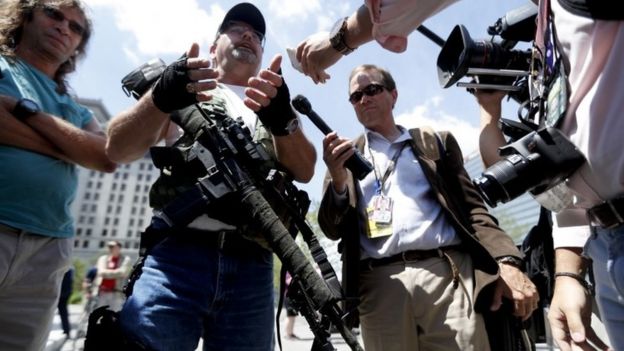
Police want to temporarily ban a law that allows licensed gun owners to carry their weapons in public
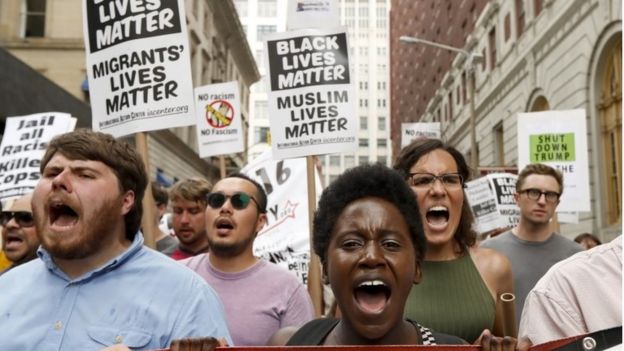
Protesters rally outside the Republican National Convention
Cleveland police have asked Ohio's governor to suspend open-carry gun rights during the convention but he said he did not have the power to.
Thousands of federal and state law enforcement officers have descended on the city over the past week in preparation for the convention, ramping up security protocols as delegates, attendees and demonstrators pour into Cleveland.
About 50,000 people are expected to travel to Cleveland during the four-day event, with protests and rallies expected to take place throughout the week.
A convention - all you need to know
1. What's the point? Each party formally nominates its candidates for president and vice president, and the party unveils its party platform, or manifesto.
2. Who is going? There are 2,472 delegates attending, selected at state and congressional district conventions, and representing each US state and territory. Plus 15,000 journalists and thousands of other party grandees, lawmakers and guests.
3. Who isn't going? Some senior figures who don't like Donald Trump have stayed away, including two ex-presidents named Bush, former nominee Mitt Romney and Ohio Governor John Kasich.
4. What's the schedule?
- Monday speakers - Melania Trump, Senator Joni Ernst, former NYC Mayor Rudi Giuliani
- Tuesday - House Speaker Paul Ryan, New Jersey Governor Chris Christie
- Wednesday - VP nominee Mike Pence
- Thursday - Donald Trump, introduced by daughter Ivanka
Source: bbc.com
- Read more
-
18/Jul/2016
Turkey coup arrests hit 6,000 as Erdogan roots out 'virus'
Turkey has arrested 6,000 people after a failed coup, with President Erdogan vowing to purge state bodies of the "virus" that caused the revolt.
Mr Erdogan's top military aide Col Ali Yazici is among those now in custody.
The overall death toll for the weekend violence has risen to 290, the foreign ministry said. More than 100 of those were participating in the coup.
Security forces are reported to have met resistance from some coup plotters who were being arrested.
Warning shots were fired at Istanbul's second largest airport, and also at a military base in central Konya province, unnamed officials said.
- What you need to know
- Who was behind coup attempt?
- Events as they happened
- Coup aftermath in pictures
- Why did Turkish coup plot fail?
"We will continue to cleanse the virus from all state institutions, because this virus has spread. Unfortunately like a cancer, this virus has enveloped the state," Recep Tayyip Erdogan told mourners at a funeral in Istanbul for victims of the coup.
Mr Erdogan broke down in tears while speaking at the funeral of a close political ally, his campaign manager Erol Olcak, and his teenage son. He said he would take the country forward in "unity and solidarity".
The president repeated an accusation that cleric Fethullah Gulen was behind the plot, and called for him to be extradited from the US. Mr Gulen strongly denies any involvement.
Drama not quite over yet - BBC's Selin Gerit in Istanbul
Emotions are running high as funerals for those killed during the coup plot are held. President Erdogan was among those mourning in Istanbul for the brother of one of his closest advisers.
"My glorious nation has given the best response to the coup plotters," Mr Erdogan said in a televised speech frequently interrupted by chants of "God is Great!" Whenever he made a reference to Fethullah Gulen, the roar of boos would come from the crowd.
Turkey has been through a dramatic 48 hours, on a scale even this country - with a turbulent past of three previous coups and a further two military interventions - had never seen before. And it is not totally over yet.
As more than 6,000 have been detained and the expectation that numbers could rise further, one Twitter user commented "this is an opportunity for the governing party to cleanse out all opposition to the presidential system".
Mr Erdogan's critics wonder if he could he make use of the latest events as leverage to push harder for a constitutional change that would further enhance his powers.
People are rallying in cities including Istanbul and Ankara, to show support for the government.
Mr Erdogan told a crowd that Turkey would consider reinstating the death penalty. He said: "In democracies, decisions are made based on what the people say. I think our government will speak with the opposition and come to a decision.
"We cannot delay this anymore because in this country, those who launch a coup will have to pay the price for it."
Capital punishment was abolished in 2004 as part of Turkey's bid to join the European Union. Nobody has been executed in the country since 1984.
Among the latest arrests to be reported was the commander of Incirlik air base in the south used by US-led coalition jets for raids against the so-called Islamic State group in Iraq and Syria. Unnamed officials said Gen Bekir Ercan Van and 10 other soldiers had been detained for their role in the coup.
Also on Sunday, more than 50 senior soldiers were detained in the western province of Denizli, including the garrison commander.
Those arrested on Saturday were reported to include Gen Erdal Ozturk, commander of the Third Army; Gen Adem Huduti, commander of the Second Army; and Akin Ozturk, the former Chief of Air Staff.
One of Turkey's most senior judges, Alparslan Altan, has also been taken into custody.
President Erdogan has called on the US to extradite Fethullah Gulen, 75, who heads the popular Hizmet movement and is said to count military chiefs and mid-level bureaucrats among his followers.
Once allies, Mr Erdogan has long accused Mr Gulen and his supporters of plotting against him.
US Secretary of State John Kerry said of any extradition, that Turkey should "present us with any legitimate evidence that withstands scrutiny".
Mr Gulen has denied any involvement in the coup. He has been in self-imposed exile in Pennsylvania for the past 15 years, and said: "I don't even know who my followers [in Turkey] are." He suggested Mr Erdogan may have staged the attempted coup himself in an attempt to tighten his grip on power.
Mr Kerry strongly rebuked a Turkish minister who suggested Washington was behind the coup. He said "utterly false" insinuations were "harmful to our bilateral relations".
US President Barack Obama has joined other world leaders in calling for all parties in Turkey to "act within the rule of law".
Source: bbc.com
- Read more
-
17/Jul/2016
Turkey army group announces takeover on TV
An army group in Turkey says it has taken over the country, with soldiers at strategic points in Istanbul and jets flying low in the capital, Ankara.
A statement read on TV said a "peace council" now ran the country and there was a curfew and martial law.
It is unclear who the group is or its level of support. Some top army officials are said to be detained.
President Recep Tayyip Erdogan said he would overcome what he called an uprising by a minority.
He told CNN Turk by mobile phone the action was by a "parallel structure" that would bring the necessary response. He has used this term in the past to refer to Fethullah Gulen, a US-based Muslim cleric he accuses of fomenting unrest.
Mr Erdogan called on people to take to the streets to oppose the uprising.
He said: "I urge the Turkish people to convene at public squares and airports. I never believed in a power higher than the power of the people."
Mr Erdogan said he was on his way to Ankara and those involved in the action would pay a heavy price. His office said he was in a secure location.
Supporters of Mr Erodgan turned out on Istanbul's central Taksim Square as reports of the attempted coup emerged.
There have since been reports of clashes there, with some on Twitter saying that gunfire has been heard near the square.
PM Binali Yildirim had earlier denounced an "illegal action" by a military "group", stressing it was not a coup. He said that the government remained in charge.
The military group's statement on national broadcaster TRT, read by an announcer, said that democratic and secular rule of law had been eroded by the current government. There would be new constitution, it said.
A Turkish presidential source told Reuters news agency that the statement was not authorised by the army's command.
There are reports Turkey's top general, General Hulusi Akar, is among those taken hostage at the military HQ.
Mr Yildirim told NTV by telephone: "There was an illegal act by a group within the military that was acting out of the chain of military command. Our people should know that we will not allow any activity that would harm democracy."
Traffic has been stopped from crossing both the Bosphorus and Fatih Sultan Mehmet bridges in Istanbul.
There are reports of gunshots and at least one loud explosion in the capital Ankara. Other reports said soldiers were inside buildings of the Turkish state broadcaster in Ankara.
Gunfire was also heard outside Istanbul police HQ and tanks are said to be stationed outside Istanbul airport. All flights are cancelled, reports say.
One European Union source told Reuters that the military action "looks like a relatively well-orchestrated coup by a substantial body of the military, not just a few colonels".
Visiting Moscow, US Secretary of State John Kerry said he hoped for peace and "continuity" in Turkey.
British Foreign Secretary Boris Johnson said he was "very concerned" by events.
Turkey's military coups
- 1993 - Claims of a "covert coup" intended to prevent a peace settlement with the Kurdistan Workers' Party (PKK)
- 1980 - Military coup following armed conflict between right-wing and left-wing groups in the 1970s
- 1971 - Military coup known as the "coup by memorandum", which the military delivered instead of sending out tanks
- 1960 - Coup by group of young military officer outside chain of command, against the democratically-elected Democrat Party
Source: bbc.com
- Read more
-
15/Jul/2016
Donald Trump chooses Mike Pence as his running mate
Republican Donald Trump has selected Indiana governor Mike Pence to be his vice-presidential running mate, according to US media reports.
Mr Trump's campaign planned to announce his selection on Friday, but cancelled the event because of the attack in Nice, France.
Sources close to campaign told ABC News that Mr Pence accepted the offer.
However, Mr Trump told Fox News on Thursday evening: "I haven't made my final, final decision."
Mr Trump hopes Mr Pence can help him appeal to the party's conservatives.
Other candidates reportedly in the running were former House Speaker Newt Gingrich and New Jersey Governor Chris Christie.
Analysis: Anthony Zurcher, BBC News, North America Reporter
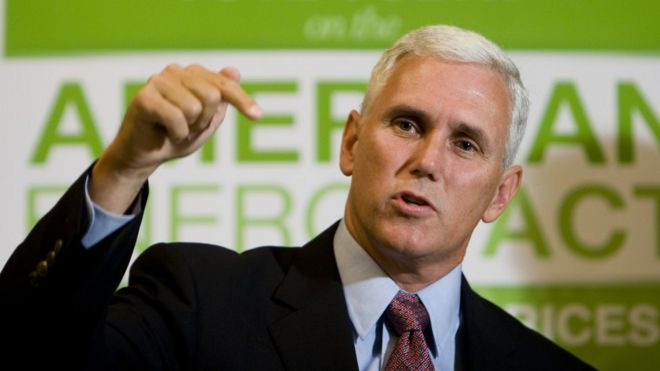
Mr Pence is the governor of Indiana
If there's anything resembling a "safe" vice-presidential pick for Donald Trump, Mike Pence is it. He has executive experience as Indiana's governor and a strong legislative resume from his 12 years as a member of the US House of Representatives.
While in Washington, he chaired the Republican Study Group, a coalition of hard-core conservatives, which gives him solid bona fides among the grass-roots Tea Party wing of the party that has occasional doubts about Mr Trump's ideological purity.
Mr Pence also hails from the mid-west, which Mr Trump's team has identified as perhaps the key battleground in his quest for the White House.
In Republican circles Mr Pence's record isn't entirely clean, however. Some on the right have criticised the governor for backing down when the state's "religious liberty" law was challenged by LGBT activists and local businesses last year.
Mr Pence's decision to expand government health-care coverage for Indiana's poor is also considered ideological heresy by some.
The real question, however, is whether Mr Pence has the rhetorical dexterity to both fulfil the traditional running-mate role of political attack dog on the stump and the nominee's most ardent defender.
Read more: Trump opts for safe choice in picking Pence
Profile: Who is Indiana Governor Mike Pence?
Before his current job, Mr Pence, 57, spent 12 years in Washington as a congressman.
His legislative experience and position of governor of a Midwestern state could give Mr Trump advantages in the general election.
The Indiana governor is strongly anti-abortion and signed a religious freedom bill, which some saw as anti-gay, into law.
The campaign hopes that Mr Pence will help boost Mr Trump's image with social conservatives who have been unsettled by Mr Trump's brash persona.
Mr Trump - a New York real estate tycoon who has never held elected office - has said he wants a running mate who could help him work with Congress.
However, Mr Trump and the Indiana governor differ on some key issues including the billionaire businessman's call to ban Muslim from entering the US.
Last year, Mr Pence tweeted that Mr Trump's plan was "offensive and unconstitutional".
He has also expressed support for free trade agreements and was in favour of the war in Iraq, which Mr Trump says he was not.
Mr Pence also criticised Mr Trump for his attacks on Hispanic judge Gonzalo Curiel, who was born in Indiana.
Mr Trump had said Mr Curiel could not possibly rule fairly in a case against him became of his Hispanic heritage.
Source: bbc.com
- Read more
-
14/Jul/2016
Brexit: UK votes to leave EU in historic referendum
The UK has voted to leave the European Union after 43 years in a historic referendum.
Leave won by 52% to 48% with England and Wales voting strongly for Brexit, while London, Scotland and Northern Ireland backed staying in the EU.
UKIP leader Nigel Farage hailed it as the UK's "independence day" but the Remain camp called it a "catastrophe".
The pound fell to its lowest level against the dollar since 1985 as the markets reacted to the results.
- Follow the latest developments on our live page
- Results in full
- Brexit: What happens now?
- Kuenssberg: PM's luck runs out
- World reaction as UK votes to leave EU
- Labour 'must change' after EU campaign
The referendum turnout was 71.8% - with more than 30 million people voting - the highest turnout at a UK election since 1992.
Wales and the majority of England outside London voted in large numbers for Brexit.
Labour's Shadow chancellor John McDonnell said the Bank of England may have to intervene to shore up the pound, which lost 3% within moments of the first result showing a strong result for Leave in Sunderland and fell as much as 6.5% against the euro.
'Independence day'
UKIP leader Nigel Farage - who has campaigned for the past 20 years for Britain to leave the EU - told cheering supporters "this will be a victory for ordinary people, for decent people".
Mr Farage - who predicted a Remain win at the start of the night after polls suggested that would happen - said Thursday 23 June would "go down in history as our independence day".
He called on Prime Minister David Cameron, who called the referendum but campaigned passionately for a Remain vote, to quit "immediately".
A Labour source said: "If we vote to leave, Cameron should seriously consider his position."
But pro-Leave Conservatives including Boris Johnson and Michael Gove have signed a letter to Mr Cameron urging him to stay on whatever the result.
Labour former Europe Minister Keith Vaz told the BBC the British people had voted with their "emotions" and rejected the advice of experts who had warned about the economic impact of leaving the EU.
He said the EU should call an emergency summit to deal with the aftermath of the vote, which he described as "catastrophic for our country, for the rest of Europe and for the rest of the world".
Germany's foreign minister Frank Walter Steinmeier described the referendum result as as "a sad day for Europe and Great Britain".
But Leave supporting Tory MP Liam Fox said voters had shown great "courage" by deciding to "change the course of history" for the UK and, he hoped, the rest of Europe.
And he called for a "period of calm, a period of reflection, to let it all sink in and to work through what the actual technicalities are," insisting that Mr Cameron must stay on as PM.
Exit process
Scotland's First Minister Nicola Sturgeon has said that the EU vote "makes clear that the people of Scotland see their future as part of the European Union" after all 32 local authority areas returned majorities for Remain.
Analysis by Prof John Curtice
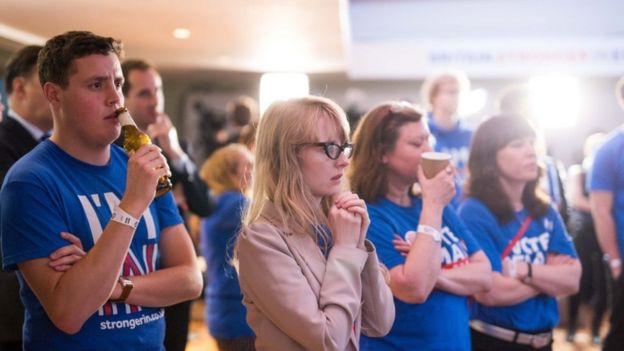
London has voted to stay in the EU by around 60% to 40%.
However, no other region of England has voted in favour of remaining.
The referendum has underlined the social and cultural gap between London and provincial England.
Remain's defeat seems to have been primarily the product of the decisions made by voters living north of the M4.
Throughout the Midlands and the North of England the level of support for Remain was well below what was required for it to win at least 50% of the vote across the UK as a whole.
Britain would be the first country to leave the EU since its formation - but a leave vote will not immediately mean Britain ceases to be a member of the 28-nation bloc.
That process could take a minimum of two years, with Leave campaigners suggesting during the referendum campaign that it should not be completed until 2020 - the date of the next scheduled general election.
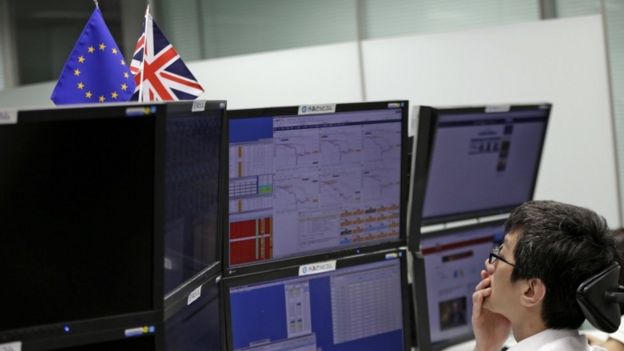
Traders in Tokyo monitor exchange rates
The prime minister will have to decide when to trigger Article 50 of the Lisbon Treaty, which would give the UK two years to negotiate its withdrawal.
Once Article 50 has been triggered a country can not rejoin without the consent of all member states.
Mr Cameron has previously said he would trigger Article 50 as soon as possible after a leave vote but Boris Johnson and Michael Gove who led the campaign to get Britain out of the EU have said he should not rush into it.
But they also said they want to make immediate changes before the UK actually leaves the EU, such as curbing the power of EU judges and limiting the free movement of workers, potentially in breach the UK's treaty obligations.
The government will also have to negotiate its future trading relationship with the EU and fix trade deals with non-EU countries.
In Whitehall and Westminster, there will now begin the massive task of unstitching the UK from more than 40 years of EU law, deciding which directives and regulations to keep, amend or ditch.
The Leave campaign argued during a bitter four-month referendum campaign that the only way Britain could "take back control" of its own affairs would be to leave the EU.
Leave dismissed warnings from economists and international bodies about the economic impact of Brexit as "scaremongering" by a self-serving elite.
Source: bbc.com
- Read more
-
24/Jun/2016
About Us
-
Archives
Recent posts
News for people who want to know
- Bakus Radio resource for |Ghana & Africa music |News |Entertainment |Sports | Copyright © 2016 . All Rights Reserved.
- Designed By Fresco Software Solution Pvt. Ltd.



























